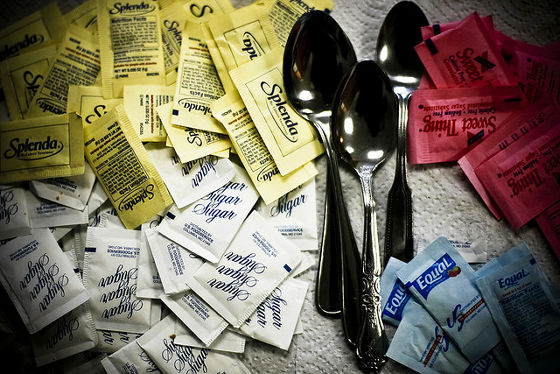Potential for artificial sweeteners to cause impaired glucose tolerance and cause diabetes

ByBrayan Esteban Esparza Gonzalez
People who care about obesityDiabetesFor people suffering from it, foods and drinks with artificial sweetener that has zero calories and sweetness seems to be fit for physical condition management. However, continuing to study artificial sweeteners for decadesWeizmann Institute of ScienceHowever, intake of artificial sweetener isGlucose toleranceIn addition to causing abnormalities and increasing the risk of diabetes,Intestinal bacteriaIt is possible to cause abnormalities in metabolism of the study was announced.
Artificial sweeteners induce glucose intolerance by altering the gut microbiota: Nature: Nature Publishing Group
http://www.nature.com/nature/journal/vaop/ncurrent/full/nature13793.html
Artificial sweeteners linked to glucose intolerance - health - 17 September 2014 - New Scientist
http://www.newscientist.com/article/mg22329872.600-artificial-sweeteners-linked-to-glucose-intolerance.html
According to a collaboration between Elan Erienaf of Weitzman Scientific Institute in Israel and Elan Seagal of his colleague, artificial sweeteners cause glucose intolerance to raise blood glucose levels and can affect intestinal bacteria It turned out to be sexual. "The most shocking thing was that artificial sweeteners to prevent diabetes may cause diabetes or cause infectious diseases," Ellenaf said. The UK soft drink industry association (BSDA"The clinical research in recent decades has shown that low-calorie sweeteners can support weight management and diabetes management," said Gavin Bartenton, chairman of the company.
Non-calorie sweetener is a synthetic product that makes you feel the sweetness of 20,000 times. Because it is non-caloric and can not be digested in the body,Type 2 diabetesDiet cok, non-calorie cereals, desserts etc. are recommended for meals to patients. Ellenaf and colleagues continued to provide research results showing the dangers of these foods for decades, and several research institutes have reassessed safety. CurrentAmerican Food and Drug Administration(FDA) is conducting a re-investigation, but there is no reasonable confirmation that the sweetener harms health.
Elinav is the most commonly used sweetener to prove the risk of sweetenersaccharin·Sucralose·Aspartame, We will observe the course by giving three mice "only water containing sweetener" "ordinary water only" "water only containing glucose". After 11 weeks we fed high glucose drinks to mice and ingested standard blood samples and tested glucose tolerance of all rats.

ByJaci Lopes dos Santos
Under normal health conditions, insulin is secreted in the body as the blood glucose level rises, and orders the cell to convert extra glucose to energy or fat. A condition in which the reaction of this process is bad is called "impaired glucose tolerance" and it is the source of type 2 diabetes. As a result of the blood test, in all rats who were drinking water with sweetener, they showed impaired glucose tolerance comparable to metabolic disorder. Mr. Segal explains, "Most sweeteners pass through the gastrointestinal tract without being digested, which means that the sweetener reaches the intestines and encounters intestinal bacteria." Researchers at this time might not change impaired glucose tolerance in the composition of intestinal bacteria? I thought.
In another test using saccharin, antibiotics were used in advance to remove intestinal bacteria in the mouse. Since there is no reaction due to blood glucose level without bacteria, the influence of impaired glucose tolerance can be excluded. As a result, although it was not seen in rats fed normal water, an increase in intestinal bacteria leading to obesity was seen in rats fed saccharin. Based on these data, researchers validated the data of 381 people and established relationships between impaired glucose tolerance and general sweetener to prove the relevance to humans.
Next, we requested cooperation from 7 healthy people who do not usually speak of artificial sweetener, and asked me to take the maximum intake sweetener per day as determined by FDA every day. Three of seven subjects did not change by 5 days elapsed, but a remarkable decrease in glucose tolerance was observed in the remaining four patients, and a large change was found in the constitution of intestinal bacteria. "The effect of artificial sweeteners may be directly involved in infectious diseases," Segar said. Mr. Ailbhe Fallon of Ajinomoto, the manufacturer of artificial sweetener / aspartame, the largest sweetener manufacturer in Europe, and the International Sweetener Association (ISA) "scientifically unfounded" showed intense opposition to this conclusion It was.

ByAndrew Morrell
Elinav said, "There are several scientific evidences that artificial sweeteners are effective in supporting obesity and diabetes, but on the fifth day the sweetener may cause impaired glucose tolerance at a level equivalent to a metabolic disorder We think that it is necessary for government agencies that do not relate at least to the artificial sweetener industry to re-investigate. " However, this result does not indicate that sugar-containing drinks are safer than sweeteners. Either way, for health it is necessary to refrain from overdose of sugar.
Related Posts:







